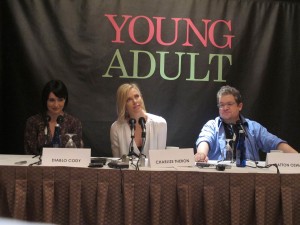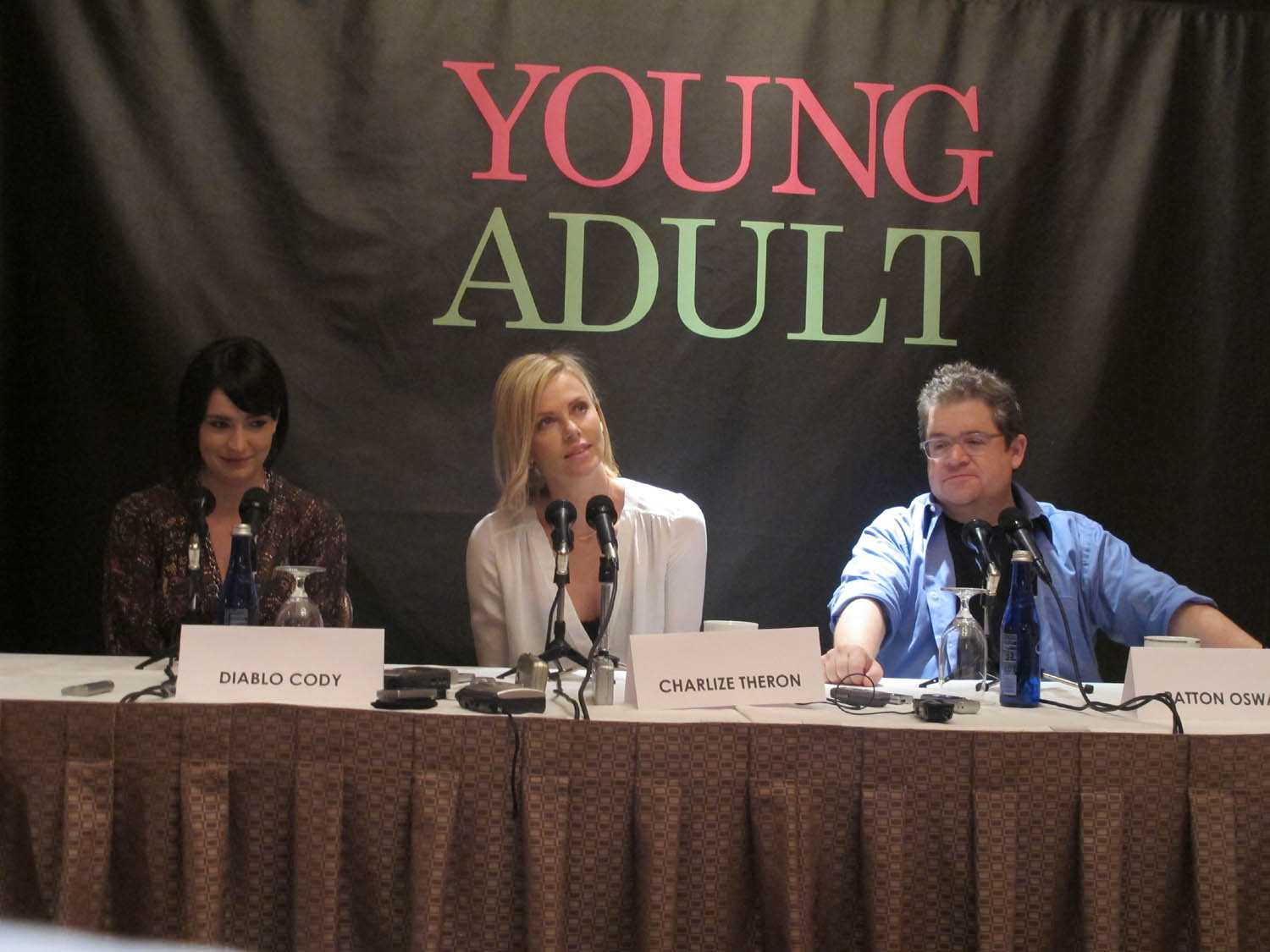
Today, Charlize Theron is probably one of the coolest gals in Hollywood. She’s tall and skinny, gorgeous and tough, smart and sexy and loves to curse. I think I counted the “F” word out of her mouth at least five times.
However, the sexy Oscar winner told us at the ‘Young Adult’ press conference at the Ritz Carlton a few weeks ago, that growing up she was teased by the mean girls.
“I actually got a lot of the ‘mean girl’ stuff out of my – I was pretty much a mess after primary school, okay.” Continued Charlize, “I really experienced a lot more of that stuff from like the ages of like 7 to 12, where there was a really, really popular girl in my school and I was obsessed with her. I mean, like you would go to jail for that stuff today. And I’m so embarrassed, because it is – I actually, I was in tears one day because I couldn’t sit next to her.”
Sandwiched between writer Diablo Cody and co-star Patton Oswalt, the blond movie star who plays Mavis, a divorced, young-adult fiction writer who returns to her hometown to crazily chase her ex-boyfriend (Patrick Wilson) who’s now married with a kid, continued talking along with Diablo & Patton.
“Yeah, well, I have issues.”
PATTON: Ah.
CHARLIZE: And then three weeks ago I was in London; I’m shooting a film there, and I was in a fitting. And this girl goes, “Oh, I know Charlene.” And it was the girl that I – that fucked me up in primary school.
PATTON: Who is now mummified in your basement.
CHARLIZE: Who now lives kind of a sad life. But I kind of got that out of my system, so that by the time I went to high school, I was kind of broken in and more immune to all of that stuff. I wasn’t really in the popular crowd. I went to art school. I was kind of obsessed with ballet. I wore really, really, really nerdy glasses. I was blind as could be. And boys don’t really like big nerdy glasses, not so much.
PATTON: No, not so much.
CHARLIZE: And I had a crush, I didn’t have any boyfriends, but I had a massive crush on this guy who – this interviewer, that just did a story on me for Vogue, actually found, and –
PATTON: What?
CHARLIZE: Yeah, he found the guy that I had said – this guy did not know I existed, by the way, in school. And then he was all, like, “Yeah, tell her the crush was mutual.” Fuck that.
PATTON: Yeah.
[LAUGHTER]
CHARLIZE: The crush was so not mutual.
PATTON: What was his name?
CHARLIZE: And then he was like, “Oh, and I remember, she wore those glasses.” And I was like, “Rrrmmmm.”
PATTON: What was the guy’s name?
CHARLIZE: Oh, I can’t do it. I’m –
PATTON: Tell me the name.
CHARLIZE: No, this guy’s gonna get hunted down.
PATTON: Oh, okay.
CHARLIZE: I can’t do it.
PATTON: Oh, is it in Vogue.
CHARLIZE: Hint, hint.
PATTON: I have a subscription. It’s waiting in my house right now, I – it’s my Bible, people. I mean, look at how I’m dressed.
QUESTION: Charlize, this character in the press that I’ve read before I saw the movie, kept talking about what an unsympathetic character she was. And I was surprised, because she seems to be an alcoholic, delusional, mentally ill person, who’s kind of a loser that you feel sorry for, rather than hating. So can you talk about how you, you know, can you talk about how you see her, and the idea of going against, well, type for – with this kind of thing.
CHARLIZE: Thanks for insulting me. (Laughter) I don’t – I mean, I’ve never been a fan of labels, you know. I just, I think it’s very easy to kind of look at somebody and just kind of throw a label on them, they’re crazy or they’re – you know. And I’m not a big fan of overly justifying bad behavior, or why people are the way they are. I think that it’s a cop-out. And I don’t have a lot of empathy for that. So I didn’t really think of her – I thought the things that she did were pretty despicable; but then again, not like to the point where I was like disgusted by her. I never had a hard time not liking her. I would love to go and have a beer with her. I mean, I would never let her hang out with my boyfriend. But I would love to hang out with her. I think she, you know, she’s entertaining about all of her stuff. And you know, people can have all of the things that she kind of – have, and just be really annoying and suck the air out of a room. And in a way, she does suck the – but it’s a funny way of sucking the air out of the room.
And I found her fascinating. I found this, I guess, you know, if you want to say against – I don’t know how to answer that. All I know is that what I liked when read Diablo’s script, was the idea of a girl, a woman, who’s dealing with very, very common mid to late 30’s issues that women can really relate to; but because of kind of how she went through life, is dealing with them the way a 16-year-old would deal with them. You know, and I thought that was really fascinating. And when she says things like, “Don’t you know love conquers all,” it’s like the typical 16-year-old would say that. And here she is, 37, like trying to get her life together. And she just doesn’t have the tools to do it. So you know, I don’t try to kind of go for the overly sympathetic – I don’t really like sympathy. I don’t like it for myself; I don’t – sometimes sympathy can feel like you’re trying to kind of victimize someone. I don’t know, maybe it’s my own shit that I have to deal with. But I think more than anything, people just want to be understood, you know.
QUESTION: We’re seeing a lot of like women behaving badly kind of movies. I wonder, you know, do you see this as a sign of progress for women in entertainment, or do you see it as a step forward or a step backward?
DIABLO: I don’t know if we’re – I mean, I’m certainly not going to call it a step back, because that would be the opposite of what I’m trying to do as a writer, and also as a female. I feel like maybe – it’s funny, when people talk about “Bridesmaids”, they always talk about, “Oh, we’re seeing raunchy women.” And I say, “No, you’re just seeing women.” Like that’s what feels fresh about this, is you’re actually seeing women in complicated, funny situations where you would normally see male characters. So I don’t really see it as – seeing women behaving badly so much as just seeing more multi-faceted female characters. And I hope there will be more of that, because I’m enjoying it.
PATTON: Yeah. I think, like it feels like, if I could just add to what you said, though – you have finally made progress as a group if you can be depicted as fully – as the full spectrum. Usually, any kind of sub-group or smaller group in a movie goes from being made fun of and victimized. And then it swings too hard the other way, where they’re like amazing and always positive, which is just as dehumanizing. And then you finally like, “Hey, a single individual can be a hero and a villain and funny and an asshole at – well, just like we all are every second of the day. So you know, that’s definitely progress, too.
DIABLO: Agree.
QUESTION: Charlize, do you have any thoughts on that?
CHARLIZE: Well, I mean, I talked a lot about this when I did “Monster”. I think that people get really kind of freaked out when they see what Diablo just really beautifully articulated. It’s just real women – conflicted. I mean, I think women are almost way more conflicted than men, and I think we come from a society that – we’re very comfortable with the Madonna whore complex, you know. We’re either really good hookers or really good mothers. But we’re not bad hookers and we’re not bad mothers, and we’re nothing in between.
And I think it is refreshing to kind of see – yeah, I mean, I grew up on cinema where guys got to do that – Gene Hackman and Dustin Hoffman and DeNiro got to play all of those kind of characters that, you know, I saw a little bit of myself in, those kind of struggles and the lurking, darky things, you know, and I – it’s very rare to kind of see women. But I think we are; I think women are doing – getting a chance to kind of play those kind of honest characters. And also, you know, when people going, “Oh, it’s so brave.” It’s like, it’s – it really isn’t. It’s just refreshing. And it’s so great as an actor to get the opportunity to do something that’s incredibly truthful. It’s been really, really nice.
QUESTION: How did you spend the last couple years? Were you looking for scripts, or taking it easy? Vacation?
CHARLIZE: On my couch. Potato chips. Unemployed. No, it sounds like it was that, but I was actually – I was getting ready to go and do “Fury Road” with George Miller in Australia. And I, initially, actually I had to pass on this, because I was – when Jason initially came to me, I was packing and going to Australia to start pre-production on “Fury Road”, which was a year shoot. And I was in Australia for two weeks, then they pushed the film, and I came back. And Jason called me up and said, “Let’s do this in a month.” And I was like, “Okay.” But I was waiting for that film to happen, and I had other things in development. I have a production company. And I was developing TV shows, and film and working with great people. Creatively, I was really satisfied. I was working with people like David Fincher and – so creatively, I wasn’t feeling like I wasn’t doing anything.
QUESTION: Charlize and Patton, your scenes together were so relaxed, so honest and real. Was there a lot of prep time? Did you do a lot of rehearsal? Were you allowed to go off script?
CHARLIZE: A lot of alcohol.
[LAUGHTER]
PATTON: Yeah, there was a lot of –
CHARLIZE: Yeah, there was a lot of alcohol.
PATTON: That helped.
CHARLIZE: Yeah.
PATTON: That was definitely – we call it ‘acting juice’ –
[LAUGHTER]
PATTON: We were – we kind of got along right at the first table read. We were teasing each other and kind of, you know – we just, there was just something, a kind of a rapport there.
‘Young Adult’ written by Diablo Cody and directed by Jason Reitman (Juno) opens in limited theaters December 9 and wide December 16. I liked the movie, go.

